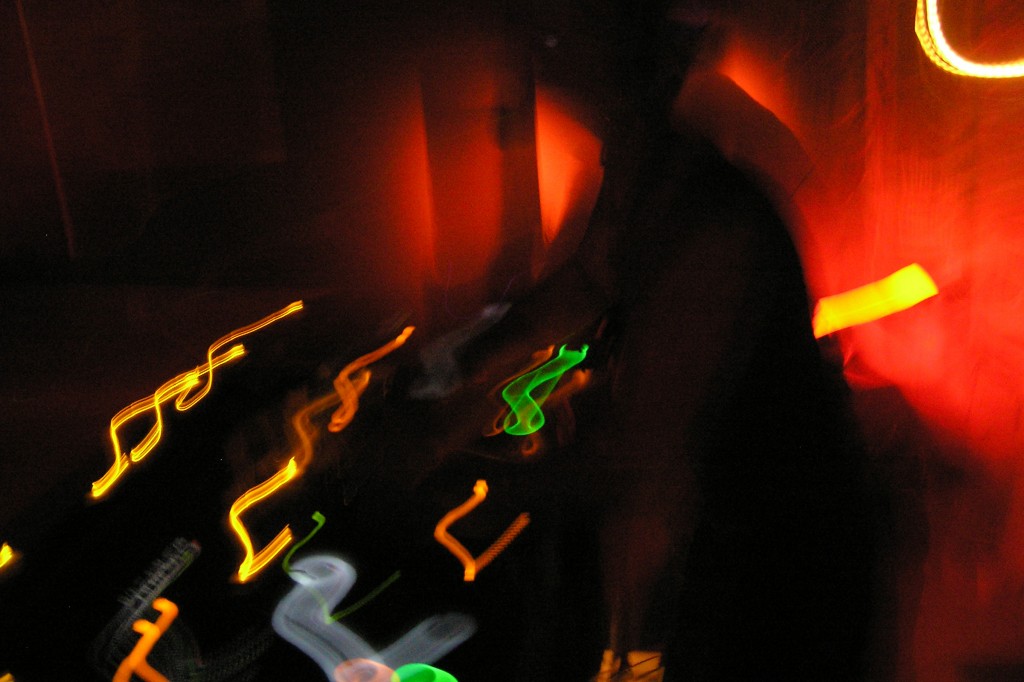Mechanical dialogues
Had this been a movie I would definitely have headed for the nearest pub. But I was trapped in the very front row of a small experimental theater with people sitting cross-legged on the floor around me. There was a definite feeling of shared watching, nothing like the separateness one has in the cinema. It would have been unkind of me to go. And suddenly the play began to work. The sheer mechanical inanity of the dialogues and the weird dislocation of the non sequiturs began to excite me, to the point that at the end of the performance, when, after the final mad scene, it appears that the whole play is simply starting over in a kind of loop, I was actually rather disappointed when it didn’t continue.
How much we disturbed the others
One appreciates then why certain avant-garde departures might only take off in the theater, and particularly in the kind of theater where the public attaches some self-regard to their willingness to tackle difficult material. Alas this also means that a lot of long-suffering folks will end up sitting through hours of tedious nonsense, and then try to cheer themselves up by imagining the work was not so bad after all.

Henry Cow in Sweden, 1978.
This I am not willing to do. It may be a question of age. After about forty minutes of the Pirandello that wasn’t Pirandello, there came a moment when, quite suddenly, all the actors retreated into the deep shadow at the back of the stage. Whether they had actually gone and this was a scene change, or whether they had faded in order to rematerialize in some revolutionary statement of the way theater ought to be, I do not know. I grabbed my friend’s hand and said, Now!
It was a matter of seconds. How much we disturbed the others and whether the actors were aware I just don’t know. But the fact is that no sooner were we out on the street than we both experienced a sort of mad euphoria. We had done it! Overcome inhibition, reclaimed our lives and our time, refused to succumb to high-minded conventions governing proper behavior in the theater. Stepping into the nearest bar and ordering a beer we even began to feel we had had an experience worth paying for. Perhaps the actors had succeeded in their revolutionary intent.
Apathy
Exploring this Platonic tendency towards a fear of posthumanism through Winner’s history, it is easy to pick out other key thinkers grappling with technological dystopianism. Consider the early Karl Marx of the Economic and Philosophic Manuscripts; Max Weber, who opposed instrumental rationality; Martin Heidegger’s critique of modern technology; and Jacques Ellul’s exploration of the monstrosity of technique. Einstein’s Nightmare captures the spirit of this history of techno-fear. The meme itself expresses such fear through the contemporary gadget par excellence, the mobile phone, which William Merrin tells us originally represented futurity and progress. Instead, Einstein’s Nightmare paints the device in such a way that encourages us to understand it in terms of closure towards slack-jawed apathy. Here, the mobile phone turns people into idiots. The McLuhanesque gadget lovers who inhabit the meme are caught in a closed loop of narcissistic, or autoerotic, self love. There is no social relation here. Instead, the principle of empty connectivity reigns and life is organised around the dictates of what Marcuse calls the “performance principle.” We must remain connected in order to perform our assigned roles in the technical order. The global technical system destroys the self in the creation of what Jaron Lanier refers to as “the hive mind.” Raging against the planet of insects, Lanier tells his reader “you are not a gadget” and tries to save the human lost in a state of technical vertigo.

